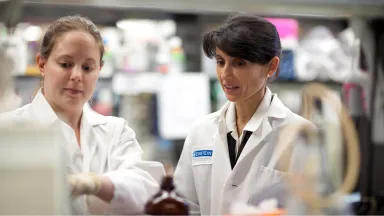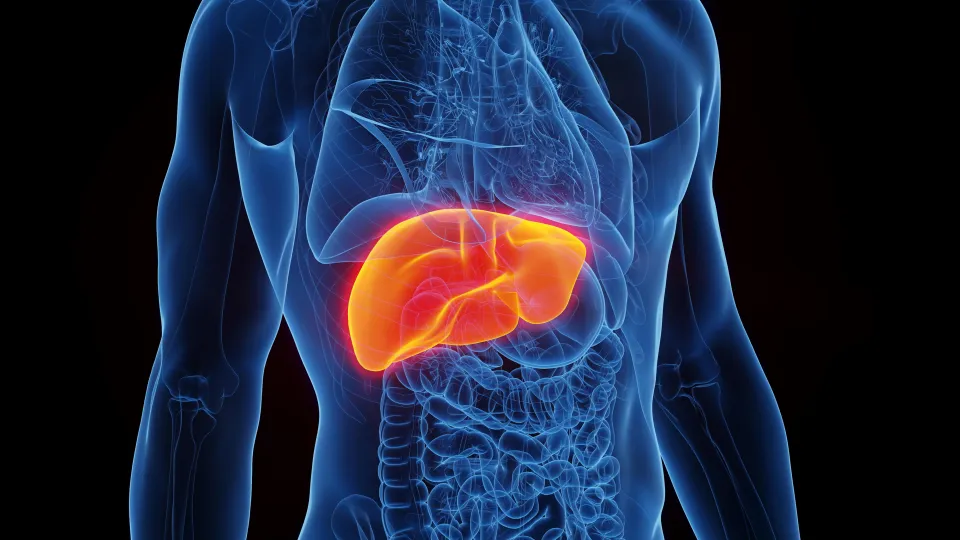
Irwin J. Kurland, M.D., Ph.D.
- Associate Professor, Department of Medicine (Endocrinology)
- Director of the Stable Isotope & Metabolomics Core Facility of the Diabetes Research Center, Department of Medicine
Location
- Albert Einstein College of Medicine Michael F. Price Center 1301 Morris Park Avenue 374 Bronx, NY 10461
Research Profiles
Professional Interests
Diabetes is an increasing concern not only for Western countries, where diet and lifestyle promote expanding waistlines and insulin resistance, but also for developing countries in which the effects of changing diet on the health of their populations are already visible. Diabetics suffer an impairment of the body's ability to switch between glucose and fat as energy sources. Even early in the evolution of diabetes (i.e., in the pre-diabetic state referred to as metabolic syndrome), individuals are unable to make this fuel switch, a physiological maladaptation termed metabolic inflexibility.
My laboratory has developed stable isotope based flux phenotyping methodology based on gas chromatography/mass spectrometry (GC/MS) to follow the “history” of glucose and other labeled substrates as they are exchanged between different organs or within the same organ, for in vivo assessment of tissue specific metabolic flexibility. These GC/MS flux profiling tests have demonstrated that some forms of insulin resistance are associated with unique, partially compensatory mechanisms of substrate re-cycling between liver, fat and muscle, as well as assessing neural influences over peripheral fuel utilization. In order to understand how dysregulations in metabolism may “feedback” to impact the proteins/enzymes that govern how fuels are selected/used, we have examined how a metabolite common to glucose, fatty acid and amino acid metabolism, acetyl CoA, acts as a “sensor” for regulating fuel usage in metabolic networks. Changes in acetyl CoA in cellular compartments help modify the acetylation of key proteins/enzymes in metabolic networks in the fasted to re-fed transition. Our hypothesis is that metabolic pathway specific insulin resistance may be a result of dysregulation of the acetylation of proteins in tissue specific metabolic networks, in either the fasted and/or re-fed states. One focus at present, in collaboration with the Accili and Haeusler laboratories, is the inter-relationship of hepatic Akt2, FoxOs and SirT1 on the fasted/re-fed metabolic and acetylome response.
We have, and are, proving the utility of these combined ‘omics methodologies, in a variety of KO mouse models of key genes regulating glucose and fatty acid metabolism. We contend that the association of a unique plasma flux profile with unique plasma/tissue metabolite profiles enables the interpretation of the metabolic network acetylome, and that the combined flux, metabolite and acetylome determination reflects the underlying pathophysiology in models of impaired glucose tolerance and metabolic inflexibility. For animal models, we have constructed a tiered framework (shown below, from Kurland et al Application of combined 'omics platforms to accelerate biomedical discovery in diabesity, Ann. N.Y. Acad. Sci. (2013) ISSN 0077-8923) in which commonly used measures of metabolism (e.g., phenotyping tests such as calorimetry and body composition analysis) and a novel deuterated glucose tolerance test (termed the hepatic recycling deuterated glucose tolerance test, or HR-dGTT) that assesses peripheral versus hepatic glucose disposal, are performed first to help determine which specific 'omics experiments to do next. By beginning with these simple whole body measurements, one can decide, step by step, on hypothesis driven, multi omic characterizations aimed towards understanding mechanisms at the molecular level.
Descriptions/details of the tests in this tiered framework can be found at:
http://www.einstein.yu.edu/research/shared-facilities/stable-isotope-metabolomics-core/services/
Selected Publications
Kurland, I.J. Accili, D., Burant, C., Fischer, S.M., Kahn, B.B., Newgard, C.B., Ramagiri, S. , Ronnett, G.V., Ryals, J.A., Sanders, M., Shambaugh, J., Shockcor, J., and Gross, S.S. Application of combined 'omics platforms to accelerate biomedical discovery in diabesity, Ann. N.Y. Acad. Sci. (2013) ISSN 0077-8923) (in press)
Zhao X, Feng D, Wang Q, Abdulla A, Xie XJ, Zhou J, Sun Y, Yang ES, Liu LP, Vaitheesvaran B, Bridges L, Kurland IJ, Strich R, Ni JQ, Wang C, Ericsson J, Pessin JE, Ji JY, Yang F. Regulation of lipogenesis by cyclin-dependent kinase 8-mediated control of SREBP-1 J Clin Invest. (2012) Jul 2;122(7):2417-27. doi: 10.1172/JCI61462. PMID: 22684109
Vaitheesvaran B, Yang L, Hartil K, Glaser S, Yazulla S, Bruce JE, Kurland IJ. Peripheral effects of FAAH deficiency on fuel and energy homeostasis: role of dysregulated lysine acetylation. PLoS One. (2012) ;7(3):e33717. E.PMID: 22442717
Yang, L., Vaitheesvaran, B., Hartil, K., Robinson, A.J., Hoopmann, M.R., Eng, J.K., Kurland,I.J. and Bruce J.E. The Fasted/Fed Mouse Metabolic Acetylome : N6-Acetylation Differences Suggest Acetylation Coordinates Organ-Specific Fuel Switching J Proteome Res.( 2011) 10(9):4134-49,. PMID: 21728379
Lv, H., Palacios, G., Hartil, K. and Kurland, I.J. Advantages of tandem LC-MS for the rapid assessment of tissue-specific metabolic complexity using a pentafluorophenylpropyl stationary phase J Proteome Res. (2011) Apr 1;10(4):2104-12. PMID: 21322650
Vaitheesvaran B, LeRoith D, Kurland IJ. MKR mice have increased dynamic glucose disposal despite metabolic inflexibility, and hepatic and peripheral insulin insensitivity Diabetologia. (2010) 53(10):2224-32, PMID: 20577711
Vaitheesvaran, B., Chueh, F.Y., Xu, J., Trujillo, C., Saad, M.F., Lee, W.N.P., McGuinness, O.P. and Kurland, I.J. Advantages of dynamic “closed loop” stable isotope flux phenotyping over static “open loop” clamps in detecting silent genetic and dietary phenotypes. Metabolomics (2010) 6(2):180-190.NIHMS161862, PMID: 20445758
Zhong L, D'Urso A, Toiber D, Sebastian C, Henry RE, Vadysirisack DD, Guimaraes A, Marinelli B, Wikstrom JD, Nir T, Clish CB, Vaitheesvaran B, Iliopoulos O, Kurland I, Dor Y, Weissleder R, Shirihai OS, Ellisen LW, Espinosa JM, Mostoslavsky R. The Histone Deacetylase Sirt6 Regulates Glucose Homeostasis via Hif1alpha. Cell (2010) 140(2):280-293, PMID: 20141841.
Xu, J., Lee, W.N.P., Phan,J Saad, M.F., Reue, K. and Kurland, I.J. (2006) Lipin deficiency impairs diurnal fuel switching. Diabetes 55(12):3429-38, PMID: 17130489
Pei L., Waki H., Vaitheesvaran B., Wilpitz D.C. , Kurland I.J. & Tontonoz P. NR4A orphan nuclear receptors are transcriptional regulators of hepatic glucose metabolism. Nature Medicine (2006) 12(9):1048-55, PMID: 16906154
Xu J, Gowen L, Raphalides C, Hoyer K.K., Weinger J.G., Renard M, Troke J.J., Vaitheesvaran B, Lee W.N.P., Saad M.F., Sleeman M.W., Teitell M.A., Kurland I.J, .Decreased hepatic futile cycling compensates for increased glucose disposal in the Pten hetero-deficient mouse . Diabetes (2006) 55(12):3372-80, PMID: 17130482.
Xu , J., Chang, V. , Joseph , S.B., Bassilian,S., Saad, M.F. Lee, W.N.P. and Kurland , I.J. Peroxisomal Proliferator-Activated Receptor alpha Deficiency Diminishes Insulin-Responsiveness of Gluconeogenic/Glycolytic/Pentose Gene Expression and Substrate Cycle Flux, Endocrinology (2004) 145(3):1087-95, PMID: 14670991.
Xu, J., Xiao, G., Trujillo, C., Chang, V., Blanco, L., Chung, B. Bassilian, S., Saad, M., Tontonoz, P., Lee, W-N. P. and Kurland, I. J. PPAR alpha Influences Gluconeogenic Substrate Utilization for Hepatic Glucose Production: The Glucose Metabolome of the PPAR alpha Null Mouse. J Biol Chem. (2002) 277(52):50237-50244, PMID: 12176975
Kurland,I.J. Alcivar,A., Bassilian,S. and Lee, W.N.P. Loss of [13C]Glycerol carbon via the pentose cycle. IMPLICATIONS FOR GLUCONEOGENESIS MEASUREMENT BY MASS ISOTOPOMER DISTRIBUTION ANALYSIS. J Biol Chem. (2000) 275(47):36787-93, PMID: 10960476
Patents
The hepatic recycling glucose tolerance test (HR-GTT) Principal Inventor: Irwin J. Kurland M.D., Ph.D.






